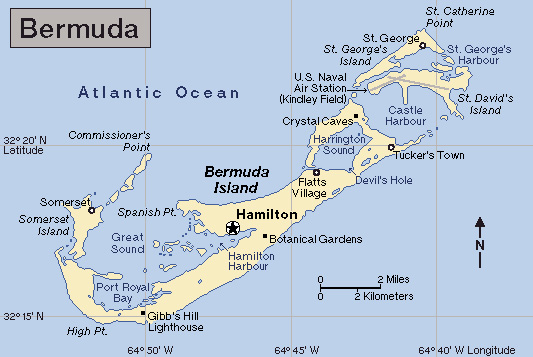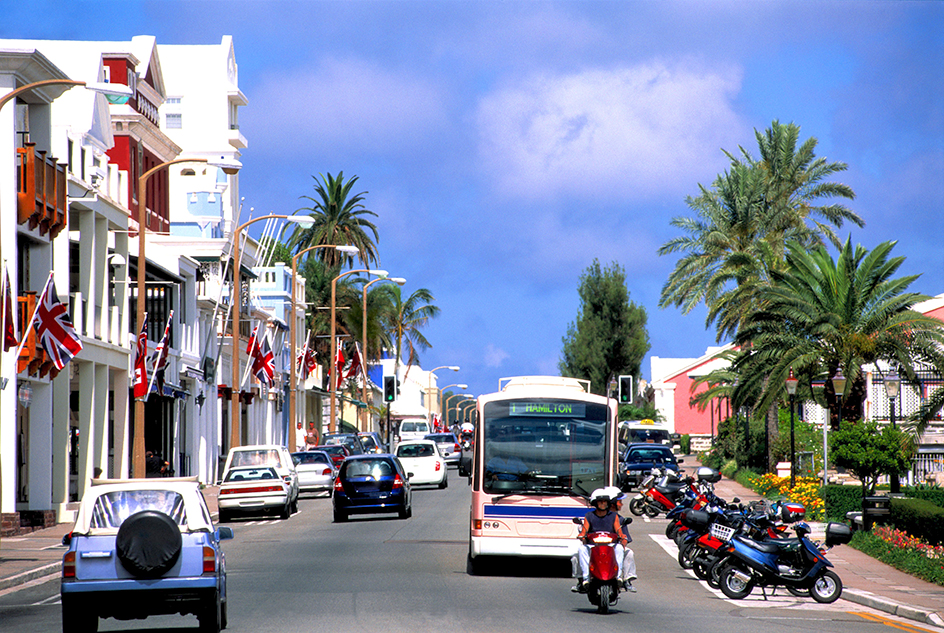Bermuda << buhr MYOO duh >>, an overseas territory of the United Kingdom, is a group of coral islands and islets in the Atlantic Ocean. It is a popular resort center.

Location, size, and description.
Bermuda consists of about 140 islands and islets, only about 20 of which are inhabited. About 670 miles (1,080 kilometers) southeast of New York City, they form one of the most northerly coral island groups in the world. The largest islands are Bermuda (also called Great Bermuda or Main), St. George’s, St. David’s, and Somerset. They extend in a chain about 22 miles (35 kilometers) long. Bridges link them with several smaller islands. Bermuda’s total land area is about 21 square miles (54 square kilometers). Bermuda occupies about two-thirds of that area. Hamilton, the territorial capital, is on Bermuda.
Bermuda’s islands are noted for their colorful flowers, palm trees, and beaches with white-pink sand. Hills and ridges on the islands rise as high as 260 feet (80 meters) above sea level.
Bermuda has few sources of fresh water. Bermudians catch rainwater in rooftop tanks and store it under buildings. The islands’ annual rainfall averages 58 inches (147 centimeters). The average yearly temperature is 70 °F (21 °C). Hurricanes sometimes strike Bermuda, usually during the autumn. In 2003, for example, Hurricane Fabian devastated the islands, causing several deaths.
Education.
Bermuda’s territorial government controls the public school system, which provides tuition-free education from preschool through high school. There is also a variety of private schools. Children aged 5 through 16 are required to attend school. Warwick Academy, founded in 1662, is Bermuda’s oldest educational institution. Bermuda College offers post-secondary education.
The people and their work.
About 66,000 people live in Bermuda. A majority of the population is of African descent. Other residents of Bermuda include people from Asia, Europe, and North America. In the 1800’s and 1900’s, many people emigrated from the Azores, Cape Verde, and Madeira islands and the Caribbean to Bermuda. All have contributed to Bermuda’s culture and traditions.
International financial services and tourism are the major sources of income. Bermuda attracts businesses from overseas by providing tax exemptions. Thousands of foreign companies, including insurance and investment firms, operate in Bermuda. The territory is one of the world’s leading centers of the insurance industry.
Bermuda’s mild climate, excellent hotels, and beaches attract many tourists. Golf, bicycling, fishing, sailing, and tennis are popular sports. Hundreds of species of fish live in nearby waters. Devil’s Hole is a natural fish pond. Other attractions include caves and such historic buildings as churches and forts.
Bermuda has little farmland, and Bermudians must import much of their food. The city of Hamilton and the town of St. George have major harbors.

Government.
Bermuda is a parliamentary democracy. The British monarch serves as head of state. The king or queen appoints a governor, who is responsible for defense, external affairs, internal security, and police service. The governor also approves all legislation on behalf of the monarch. A premier serves as head of government. The premier is the leader of the majority party in the House of Assembly, the lower house of Parliament. The governor appoints a Cabinet, chosen by the premier, to help govern the territory.
Bermuda’s Parliament includes an 11-member appointed Senate and a 36-member elected House of Assembly. Members of the House of Assembly serve terms that last up to five years. The governor appoints senators after each House election.
From the late 1700’s to the 1950’s, British forces protected Bermuda. Today, the local Royal Bermuda Regiment and the United Kingdom share this responsibility.
History.
The Bermuda Islands were named for the Spanish navigator Juan de Bermudez, who discovered them about 1505. A Spanish attempt to establish a colony in the 1500’s failed, and the islands remained largely uninhabited until the 1600’s. Mariners avoided the islands because of their perilous barrier reefs.
The Sea Venture, an English ship carrying colonists to Virginia, was destroyed near the islands during a storm on July 28, 1609. The castaways stayed on the islands for a time, built two ships, and sailed to Virginia in 1610. At Jamestown, they found the settlers starving. Admiral George Somers, the Sea Venture’s captain, returned to Bermuda for supplies. But he died shortly after his arrival. For a while, Bermuda was known as the Somers Islands. The island of Somerset was named after Somers, and Bermudians celebrate Somers Day on July 28.
King James I of England awarded Bermuda to the Virginia Company in 1612. The company controlled the islands briefly. Another English company, known as the Bermuda Company or the Somers Island Company, managed the islands from 1615 until 1684. That year, the English monarchy took over direct administration of the islands. St. George served as the capital until 1815, when Hamilton became the new capital.
English settlers in Bermuda kept African and Indigenous (native) enslaved people and indentured servants in the 1600’s. Enslaved people and servants worked as agricultural laborers, artisans, domestic servants, and sailors.
From the 1680’s to the early 1800’s, Bermuda carried on a thriving merchant trade with the Caribbean Islands and North America. Other economic activities included salvaging wrecked ships, building boats from local cedar wood, and privateering, in which governments hired privately owned ships to attack and raid enemy vessels. During the late 1600’s, Bermudians developed a salt industry on the Turks Islands.
Blockade-running for the Confederacy became profitable during the American Civil War (1861-1865). During the Prohibition era in the United States (1920-1933), smugglers transported alcoholic beverages through Bermuda to U.S. ports. Bermuda was also the site of U.S. air and naval bases for part of World War II (1939-1945).
Slavery was abolished in 1834, but racial discrimination persisted well into the 1900’s. Following a boycott of theaters in 1959, such businesses as banks, cinemas, and hotels ended policies of racial segregation. Racial integration of Bermuda schools began in the 1960’s. Also in the 1960’s, legislation gave the right to vote to all adult citizens. In 1971, Sir Edward Richard became Bermuda’s first government leader of African descent.
In 1995, voters rejected a referendum on independence, and Bermuda remained a British overseas territory. In 1998, the Progressive Labour Party (PLP), largely representative of Bermudians of African descent, won control of the government for the first time. The party remained in power following general elections in 2003 and 2007. The opposition One Bermuda Alliance won a general election in 2012, but the PLP returned to power in 2017.
